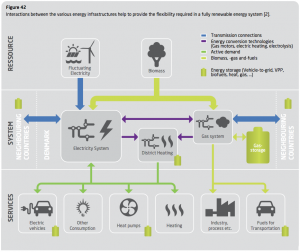 DTU researchers in cooperation with leading Danish and international experts have recently published a very nice annual report on energy storage options for future sustainable energy systems
DTU researchers in cooperation with leading Danish and international experts have recently published a very nice annual report on energy storage options for future sustainable energy systems
The report deals with global, regional and national perspectives on current and future energy issues. Each report is based on internationally-recognised scientific material and is fully referenced. Furthermore the reports are refereed by independent international experts.
The preface starts like this:
One of the great challenges in the transition to a non-fossil energy system with a high share of fluctuating renewable energy sources such as solar and wind is to align consumption and production in an economically satisfactory manner. Energy storage could provide the necessary balancing power to make this possible. This energy report addresses energy storage from a broad perspective: It analyses smaller stores that can be used locally in for example heat storage in the individual home or vehicle, such as electric cars or hydrogen cars. The report also addresses decentralized storage as flywheels and batteries linked to decentralized energy systems. In addition it addresses large central storages as pumped hydro storage and compressed air energy storage and analyse this in connection with international transmission and trading over long distances. The report addresses electrical storage, thermal storage and other forms of energy storage, for example conversion of biomass to liquid fuel and conversion of solar energy directly into hydrogen, as well as storage in transmission, grid storage etc. Finally, the report covers research, innovation and the future prospects and addresses the societal challenges and benefits of the use of energy storage.
The reports summarizes a set of recommendations to stimulate development in energy storage technologies and their integration in energy systems that is worthwhile reading:
Research initiatives
- Since energy storage must be expected to be a corner- stone of future renewable energy systems, it should be supported as a separate field of research.
- Strong and focused support for materials R&D relevant to energy storage technologies should be prioritised.
- In the longer term, to realise a future 100% renewable–based energy system, research and innovation must ensure development of the flexibility and associated solu- tions needed to ensure a reliable and economic energy system.
Pilot and demonstration projects
- The increased research efforts should be accompanied by demonstration projects in grid integration of energy storage, thermal management and industrial waste heat stor- age, grid-connected battery storage, and heat storage (including underground technology).
- Demonstration of connections between grids, such as the power-to-gas concept in which electricity is converted to synthetic methane or hydrogen.
Market initiatives
- Design of market terms for integrating energy storage in electricity markets.
- Development of a market-based approach to the allocation of flexibility so as to provide flexibility in an economical manner.
System initiatives
- Sizing and positioning of storage in powersystems should account for the variability and predictability of stochastic power generation, network topology and network usage, and the economics of storage operations.
- Regulatory settings should be developed to favour the effective coupling of the power, heat and gas infrastructures.
You can read the full report and view the attached presentations at dtu.dk
